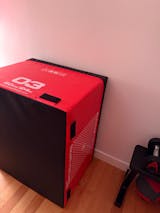
Barbell Rear Delt Row: Rear-Delt Thickness, Shoulder Balance & Stronger Upper-Back
Want shoulders that actually look strong from the back? The short answer: the barbell rear delt row is the secret. It targets neglected muscles, boosts posture, and pairs perfectly with our best-selling fixed barbells. Stick around — those rear delts deserve their moment to shine.
What Is the Barbell Rear Delt Row?
Definition & movement pattern — wide-grip barbell row for rear delts
The barbell rear delt row (also called rear delt row barbell or rear delt barbell row) looks like a normal row at first glance. But instead of tucking the elbows in, you flare them wide and pull toward the upper chest. The goal isn’t just moving the bar — it’s pulling with precision so the rear delts do the heavy lifting.
Barbell Row vs Barbell Rear Delt Row — elbow angle, torso lean, target muscle
Think of it like shifting the spotlight. Traditional rows say, “Lats, you’re up!” The rear delt row says, “Nope, this time it’s the delts’ show.” A slightly higher elbow path changes everything — suddenly you feel a deep burn across the upper back.
Why rear delts matter
If your shoulders round forward or presses feel unstable, your rear delts are waving a red flag. Strengthening them evens out the front-to-back tug-of-war happening across your shoulders.
Where it fits best
Place it as a finisher on shoulder day or an accessory movement on back day. Small muscle, big impact.
Barbell Rear Delt Row Muscles Worked
Primary — rear delts, traps, rhomboids
These muscles create that “3D shoulder” look. They also keep your shoulder joint centered and happy.
Secondary — rotator cuff, lats, grip
Even though the rear delts lead the lift, the supporting cast keeps your posture locked in.
Are rear delts shoulders or back?
Yes.
They’re physically part of the shoulders but function like upper-back heroes — pulling, stabilizing, and preventing shoulder collapse.
How to Do Barbell Rear Delt Row With Proper Form
Setup — grip wide, hinge strong
Bend forward with a solid hip hinge, torso angled 30–45 degrees. Grip the bar wider than shoulder width. Brace like you’re preparing to get poked in the ribs.
Pull — elbows high
Imagine leading the movement with your elbows instead of your hands. Pull toward your chest line — not your belly — if you want the rear delts to fire.
Lower — slow & stretched
Control the descent. Feel the muscle lengthen. That’s where growth is earned.
Common mistakes to avoid
-
Turning it into a lat row
-
Shrugging like you’re saying “I don’t know”
-
Using momentum instead of muscle
Targeting the rear delts properly
If you feel your traps taking over, widen your grip slightly and lower the weight.
Rear delts love clean execution.
Benefits of Barbell Rear Delt Rows
Shoulder balance = fewer injuries
Too much pushing and too little pulling can ruin shoulders fast.
This movement restores balance before problems start.
Stronger posture & pressing performance
When rear delts are strong, your bench, overhead press, and even push-ups feel more stable.
Upper-back thickness that shows
Big backs get noticed.
This movement fills out the upper rear shelf that stands out in T-shirts.
Programming & Training Tips
Reps & sets
Rear delts respond well to 3–4 sets of 10–15 reps.
Chase the burn, not the ego.
Weekly frequency
Hit rear delts 2–3× weekly if you want them to grow.
Do rows work rear delts?
Rows can help — if form is dialed in.
If lats dominate your rows, your rear delts stay neglected.
Technique is everything here.
Barbell Rear Delt Row Variations & Alternatives
Dumbbell Rear Delt Row
More range of motion. More freedom for your shoulders.
Cable Rear Delt Row
Smooth tension from start to finish.
Seated Rear Delt Row
Takes your lower back out of the equation completely.
Reverse Fly
A classic choice — always effective.
Face Pulls
If shoulder health had a favorite exercise, this would be it.
When to swap movements
If you struggle with the hip-hinge position, pick a variation that gives your back more support.
Safety & Shoulder-Friendly Modifications
Warm-up first
A few minutes of banded rotator cuff work saves a lot of grief.
Grip adjustments
Too much trap activation?
Bring elbows slightly lower and slow the reps down.
Low-back protection
If you feel strain instead of activation — support your torso on a bench.
The goal is muscle work, not survival.
Recommended Equipment for Barbell Rear Delt Rows
Barbells — Straight Bar, Fixed Straight Bar, EZ Curl Bar
Our best-selling fixed barbells (20–115 lb) make this exercise smooth and controlled — especially during accessories.
Plates — Olympic Grip Plates & Bumpers
Load up gradually with 2.5–100 lb for progressive growth.
Trusted brands we carry
Body Solid, Escape Fitness, Intek Strength, TAG Fitness, TKO, Troy, USA Sports by Troy, VTX, York
Reliable. Durable. Designed for results.
Weekly 5% promos + bulk offers
If you’re outfitting a home or commercial gym, we’ll hook you up with custom pricing that beats the big retailers.
Final Takeaway — Why Barbell Rear Delt Rows Belong in Your Program
Rear delts complete the shoulder picture
When they grow, your physique transforms — instantly more athletic, more powerful.
Your technique is your progress
Control every rep. Feel the muscle working. Skip the ego.
Ready for the next workout?
Add 3×10–12 barbell rear delt rows this week.
Your upper-back and shoulders will thank you.



Leave a comment